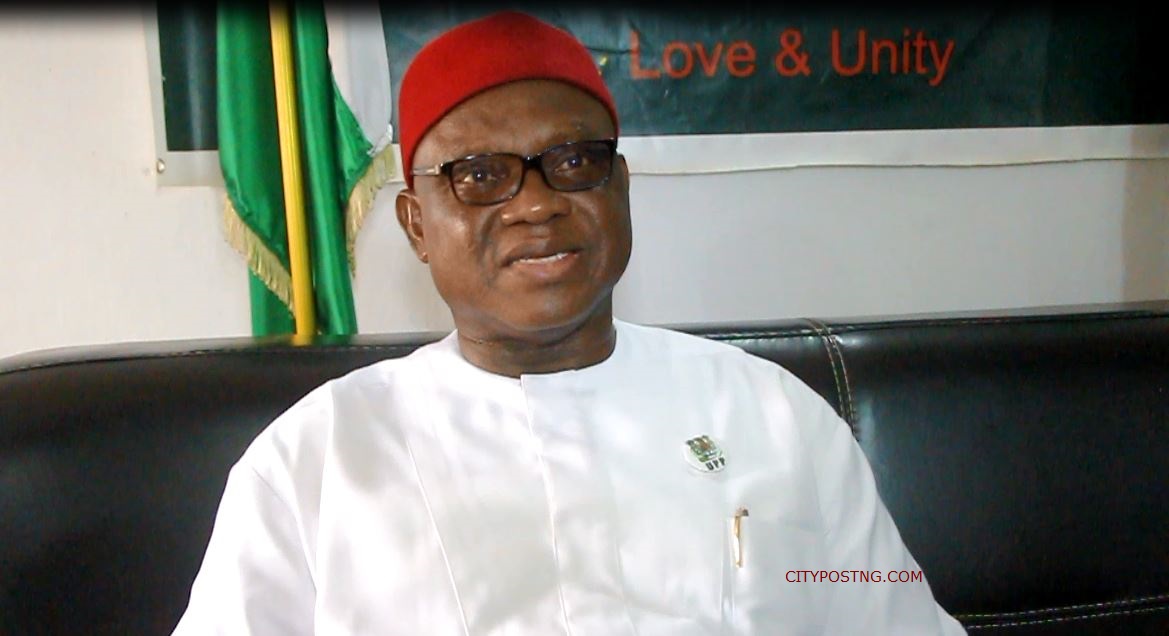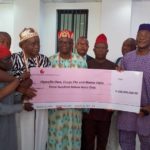|
Getting your Trinity Audio player ready...
|
Chief Chekwas Okorie is the National Chairman, United Progressive Party (UPP) and was the presidential candidate who represented the United Progressive Party (UPP) during Nigerian general election, 2015. He was also a former National Chairman, All Progressive Grand Alliance (APGA). In this encounter with CITYPOSTNG.COM Editor-in-Chief, Odomero Igbodo, Chief Okorie speaks on wide range of national issues including pervading hate speeches, restructuring, secession and Buhari’s meeting with late Odumegwu Ojukwu…
There is a lot of hate speeches in the country. Speeches that make people say things that they shouldn’t say to other people especially creating a whole gap of tribal divides. This is most predominant in the social media as stated by President Mohammadu Buhari during his speech when he came back from the United Kingdom. How can Nigeria as a nation move away from speeches like these and strengthen national unity, bearing in mind unity in diversity?
First, I like to locate this rising issue of hate speeches on the realm of extreme anger. Because it is generally known that any angry man is not a rational person. Because, once you get angry, the first thing that takes flight is rationality.
This country has degenerated very fast in the area of giving people sense of belonging, in the area of promoting patriotism, in the area of equity, justice and fair play. These areas have not fared very well and some people are more affected than others. And when you deal with a powerful person even on individual basis, and you know you can’t confront him physically, you make do with some hate speech because it gives you some pleasure that you have said something back to express your anger.
The other thing is that when you lack logic, like when you are arguing or debating with somebody and you have a superior logic and that person cannot match your logic, you see him resort to hate speech or name-calling just to divert the real issues at stake.
Having said that, what I have just done is to lay the background to the fact that government has a lot to do to make people feel a sense of belonging, a greater sense of patriotism, a greater sense of justice, equity and fairness and when these things happen and the society is far better improved than it is today, there will be less incidence of hate speeches because it wasn’t like this before. This thing is a new development.
How did it get this bad?
The situation in the country kept degenerating, all of the areas, the indices I have just mentioned, didn’t just get bad over night, it kept degenerating from the PDP government and got worse with present APC government.
As a matter of fact, it was the general discontent that led to the PDP government losing in the Presidential election and most of the seats in the general election. Some people have said that it wasn’t PDP that lost the election; it was the President that lost the election- that is former President Jonathan.
I didn’t want to agree with that because it is the party that goes to the election and it is a party that loses the election, even though they use individuals to do so.
Here we have APC government that people had so much expectation, positive expectation, that there would be some changes and of course they came with a change mantra and I can tell you that for every Nigerian, except somebody is living in denial or telling himself some lies, the change has not really come. Nothing has improved. There is no area we can say that this area is now substantially better than what it was before this government came into power.
This government promised job and that is the area that is most problematic because we have every year, thousands of youths graduating from tertiary institutions, secondary institutions, technical institutions, all being idle pouring into the streets, year after year. And this thing leads to social vices, all kinds of frustrations, and all sorts of anger. So, rather than create jobs, we have loss of jobs even those that were existing. If we have not lost jobs completely, some companies have cut down on their remunerations, salaries and benefits to employees, just to be able to keep them still working, failing which they just show them the door. And so that has not helped matters.
Here we have the anti-corruption thing. that’s the only area you can see there is some marginal improvement because it could appear that perhaps the fear of President Buhari has become the fear of God in the area of corruption. Then, I can also be charitable enough to say that in the area of agriculture, there has been also some marginal improvement. But the country is large; there are so many sectors to just be satisfied with the two areas I just mentioned. It is a litany of woes really if one wants to go into all the details.
What is the place of government in putting a stop to issues like these? We have seen hate speeches being one of the reasons why we have a fall down in law and order in African countries. What should be the role of government?
Hate speeches can be very dangerous. It solves no problem rather it worsens existing problem especially in regards to interpersonal, inter-ethnic, inter-religious relationships. And Nigeria being a multi -ethnic and multi religious nation, hate speeches tend to worsen situations.
However, there is a tricky situation there. We have the international charter and conventions on freedom of speech and freedom of association, freedom of expression; and you wouldn’t exactly know the actual classification of what may be called hate speech. A lot of definitions, varying, conflicting definitions have been proffered to locate what constitutes hate speech. Whether it is just because it is inciting because is so personal.
But then, I think that we have the law of libel and it is still very functional. It is just that we have a judicial system that is not reliable, is so slow in dispensation of justice and so even government finds it a little reluctant to even go to their own courts. When I say their own court, is because it is another arm of government; because of these delays. If people know that if they go beyond the bounds of the law, to say things they are not supposed to say to one another and are brought before the law and justice is done expeditiously, they will be more careful.
When people know that some people have gone to prison not because people hate their faces or they just expressed ordinary views, but that they said something that is against the law for which they went through trial and sent to court, people will be more circumspect in what they say.
Another aspect is that we ought to have reached a state where technology should enable us to trace people who even use pseudonyms to do these hate speeches in the social media.
Because often, those who say these things do not use their actual names. But we have reached a stage where is so easy now to track the source of these hate speeches and deal with them according to law. Not just hounding people into detentions without subjecting the person to due process of the law.
Just recently the Vice President before the President came back did say that hate speeches forthwith will be dealt with as an act of terrorism. A lot of people and discussants across divides have said that this could be a ploy by the government to muscle up the opposition voice. Could this be seen to be true?
Yes, anybody saying that is not far from the truth. It also could be a ploy to take out certain kind of vendetta on people that the authority does not seem to like. That is why I still go back to the rule of law. I was surprised actually; taken aback that a Vice President who is the Senior Advocate of Nigeria and Professor of law could make such extreme statements because I consider it quite extreme.
If hate speeches could be regarded as terrorism, then I think the starting point is for the presidency to come up with an executive bill, then it goes to the National Assembly and have it legislated upon and then we will now know that it is part of our laws. But I think it was not properly thought through before he made that statement.
Nigerians are beating different kinds of drums. Drums of secession, drums of restructuring, and drums of unity that is set to be non-negotiable. Which of these beats do we dance to?
Well, any person saying that Nigeria’s unity is not negotiable is simply deceiving himself. There is the oldest institution known to man- which is the marriage institution. That is the institution established by God, the creator of heaven and earth. It is so written in the Bible, it is also written in the Koran and those books especially the Bible I am much conversant with are provided for circumstances which marriages could even be dissolved, other than death which they say until death do us part, there are circumstances.
So a contraption of human beings like Nigeria, the contraption by the colonial master called Lord Lugard. You clustered ethnic nationalities that enjoyed certain kinds of autonomy before independence into one country and you say that the unity of that kind of contraption is non-negotiable. That is not right.
I also have heard the President in his speech when he came back from his health vacation. He speaks about his encounter, his meeting with late Odumegwu Ojukwu about the issue that he said that it was a settled matter between them, that Nigeria’s unity was non-negotiable.
I am privy to that meeting because that was the time I was the chairman of APGA, Dim Odumegwu Ojukwu was our Presidential candidate and the election had just been over. This was actually on the 19th of May 2003.
I couldn’t follow him to Daura, but one of us, Dr Timi Menakaya accompanied him, because I was busy with party matters. But as soon as he came back he gave me the copy of the communiqué, two of them signed.
Yes, they agreed that Nigeria’s unity should be preserved. The word non-negotiable was never in that communiqué. They also agreed that the unity must be anchored on equity, justice and fair-play.
Thereafter, Dim Odumegwu Ojukwu has made several statements to say that the kind of unity we have in Nigeria is like the unity of Jonah in the belly of the whale.
Jonah while in the belly of the whale for those who are conversant with that part of the scripture was rather uncomfortable because the belly of the whale was dark and uncomfortable and he was not there out of his own wish but by God’s command that he had to get to Nineveh. So Dim Odumegwu Ojukwu used that analogy to show the kind of unity that we have in Nigeria. But the unity we prefer will be the unity where Jonah would breathe the air of liberty, air of freedom, and air of comfort, not in the belly of the whale. What we have in Nigeria cannot change from what the late Dim Odumegwu, Ezeigbo Gburugburu described our unity to be.
Our unity is so much negotiable, just like marriages are negotiable; almost negotiated on a daily basis. Once you stop negotiating with your wife on how the family can be run amicably, the marriage breaks down.
So, I don’t see how anybody can say it is not negotiable and the things that make Nigerians unhappy with the way things are, are so very obvious. Above all, one positive step was taken just at the twilight of Jonathan’s administration and that was a national conference that succeeded beyond the expectation of many in the sense that over 607 recommendations were arrived at by consensus. It was unbelievable in this country as diverse as Nigeria arrived by certain recommendations by consensus.
All the states of the federation sent their what they considered as their best teams. these states now have 24 being APC states, that is majority of APC participated in coming to that decision and one would have thought that though the former president developed cold fear or that he thought he would win the second term election and therefore implement the recommendations at his own term and all that, whichever one, he didn’t get to the level of an implementation. All of us were shocked, disappointed that our president was quick, quiet ending his administration to wave outside that monumental epoch-making conference.
That is why as a leader of the United Progressive Party, we decided to make the issue of 2014 national conference a campaign issue for 2019. So most of the highlights of the recommendations were now contained in our upgraded manifesto which was ratified by our convention on the 29th of June 2017.
All of those things about self- determination, referendum, restructuring, devolution of power, resource control, state police and community policing, unconditional release of prisoners of conscience. All of these are highlights of our manifesto.
And we are the only political party of the 45 that exist today, that is bold, that is radical, that is ideologically switched on to be able to incorporate all of these things into it so that as we approach this election year 2019 that is fast coming, Nigerians will now be given the option to decide whether they want to remain the way things are or go by way of a party that has a social contract that conforms to what they would like Nigeria to be.
Talking about succession, I don’t think it is…, it is an extreme option, just like the other thing the Vice President said when he was acting president. It’s when you have tried everything possible to live in peace and all you get, the signal you get is that you are not wanted; you will begin to consider the possibility of being on your own, of exiting.
I will give you one interesting example that exists here in Africa we ought to have learnt from. Ethiopia had inter- ethnic fight for nearly 30 years. Many countries, United Nations, African Union came in to help solve the problem in Ethiopia. But when they eventually came around a roundtable to draw a new constitution, one of the provisions in article 31 of Ethiopian Constitution has a provision for an exit… it has an exit clause; that, should any ethnic nationality feels so strongly as to leave the union, it will invoke that section. And what does it entail? Plebiscite; which is the same as the referendum we are talking about. And the moment all that was signed, Ethiopia had been generally and relatively peaceful and no section of their many ethnic groups has opted to invoke that section for the simple reason that nobody is riding roughshod over the other. So, everybody now knows that each group has the option to exit if you want to treat it as if it is a second class citizen. So, if you suggest that in Nigeria they will think it is heresy. But, this is what is happening in Ethiopia.
Of course, we have referendums in the United Kingdom, in Canada, in Spain, everywhere they have practised it and most times these referendums have not succeeded because the countries have always made more concessions to those wishing to go. The people of Canada have had two referendums and they all failed because the Canadian government continued to provide more and more concessions that more majority of the people wish to remain in a bigger country than to opt out.
That of Scotland is not too far long it took place and of course, concessions were made and so on and so forth. So, there are things that our government must allow to exist in order to stabilise our unity, grow our democracy and of course make Nigeria a safer place.




